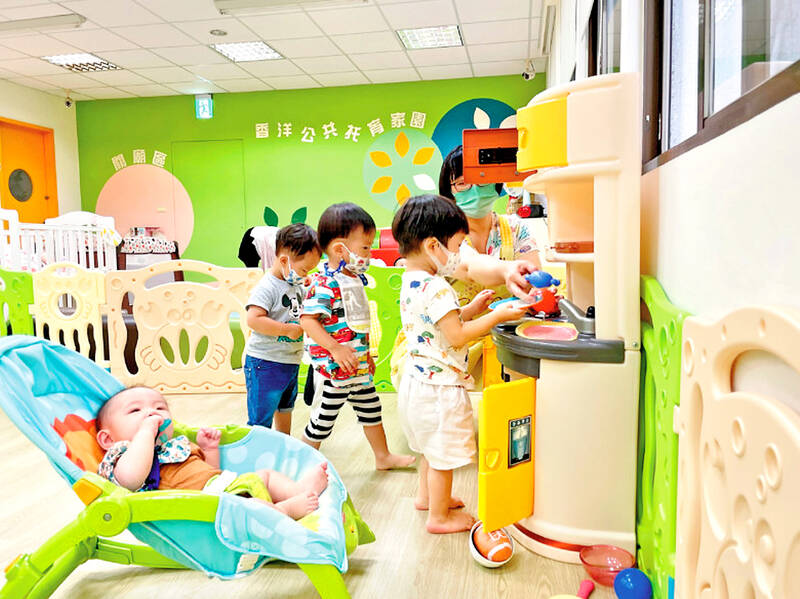A government birth subsidy, providing up to NT$100,000 (US$3,326) and proportional to the number of children born, would take effect on Jan. 1 next year, Minister Without Portfolio Chen Shih-chung (陳時中) said yesterday.
The Executive Yuan’s policy would address payout discrepancies for birth subsidies across government insurance programs, Chen said.
From the first day of next year, participants in any national insurance program, such as the Civil Servants’ Insurance, the Labor Insurance, the Farmers’ Insurance, the National Insurance and the Military Personnel Insurance, would be eligible for NT$100,000 per newborn, he said.

Photo: Chung Li-hua, Taipei Times
The measure would include the 7,144 people nationwide who are not covered by any government insurance program to ensure that everyone is guaranteed basic benefits, he said.
The policy would add NT$4.72 billion to the Executive Yuan’s NT$8 billion birth subsidies fund, Chen said, adding that 127,000 people are expected to benefit from it.
Government subsidies for new parents aged 39 or younger would increase to 84 percent from 55 percent, significantly reducing the amount they pay out of pocket, he said.
The policy would also increase subsidies for couples undergoing artificial fertilization procedures, Chen said.
The policy lowers the age ceiling for women to be eligible to undergo government-funded artificial fertilization to 39 from 40 and has subsidies for up to six attempts, he said.
Subsidies for the first attempt would increase to NT$150,000 from NT$100,000, while subsidies for the second and third attempts would be NT$100,000, up from NT$60,000, he said.
Subsidies for attempts No. 4 to 6 would remain NT$60,000, he added.
Women aged 39 to 44 would be eligible for subsidies for three attempts, NT$130,000 for the first, NT$80,000 for the second and NT$60,000 for the third, he said.
The decision to prioritize those aged 39 and younger was to encourage couples in need to seek medical help at an earlier age, Chen said.
Low-to-middle-income families are still eligible for the maximum NT$150,000 subsidies, he added.
Women aged 39 or younger have to have one fertilized embryo implanted per attempt to be eligible for the subsidies, while those aged 40 or older may have two, he said.
The Executive Yuan’s policy also subsidizes cryopreservation, targeting women aged 28 to 30, with payments of NT$70,000 for the process, and NT$8,000 for oocyte retrieval, processing and preservation, Chen said.
Women whose ovarian function has been damaged as a result of conditions such as breast cancer, bloodborne diseases, lymphoma or multiple myeloma can apply if they are referred by a doctor, Chen added.

UKRAINE, NVIDIA: The US leader said the subject of Russia’s war had come up ‘very strongly,’ while Jenson Huang was hoping that the conversation was good Chinese President Xi Jinping (習近平) and US President Donald Trump had differing takes following their meeting in Busan, South Korea, yesterday. Xi said that the two sides should complete follow-up work as soon as possible to deliver tangible results that would provide “peace of mind” to China, the US and the rest of the world, while Trump hailed the “great success” of the talks. The two discussed trade, including a deal to reduce tariffs slapped on China for its role in the fentanyl trade, as well as cooperation in ending the war in Ukraine, among other issues, but they did not mention

Japanese Prime Minister Sanae Takaichi yesterday lavished US President Donald Trump with praise and vows of a “golden age” of ties on his visit to Tokyo, before inking a deal with Washington aimed at securing critical minerals. Takaichi — Japan’s first female prime minister — pulled out all the stops for Trump in her opening test on the international stage and even announced that she would nominate him for a Nobel Peace Prize, the White House said. Trump has become increasingly focused on the Nobel since his return to power in January and claims to have ended several conflicts around the world,

GLOBAL PROJECT: Underseas cables ‘are the nervous system of democratic connectivity,’ which is under stress, Member of the European Parliament Rihards Kols said The government yesterday launched an initiative to promote global cooperation on improved security of undersea cables, following reported disruptions of such cables near Taiwan and around the world. The Management Initiative on International Undersea Cables aims to “bring together stakeholders, align standards, promote best practices and turn shared concerns into beneficial cooperation,” Minister of Foreign Affairs Lin Chia-lung (林佳龍) said at a seminar in Taipei. The project would be known as “RISK,” an acronym for risk mitigation, information sharing, systemic reform and knowledge building, he said at the seminar, titled “Taiwan-Europe Subsea Cable Security Cooperation Forum.” Taiwan sits at a vital junction on

LONG-HELD POSITION: Washington has repeatedly and clearly reiterated its support for Taiwan and its long-term policy, the Ministry of Foreign Affairs said US Secretary of State Marco Rubio yesterday said that Taiwan should not be concerned about being used as a bargaining chip in the ongoing US-China trade talks. “I don’t think you’re going to see some trade deal where, if what people are worried about is, we’re going to get some trade deal or we’re going to get favorable treatment on trade in exchange for walking away from Taiwan,” Rubio told reporters aboard his airplane traveling between Israel and Qatar en route to Asia. “No one is contemplating that,” Reuters quoted Rubio as saying. A US Treasury spokesman yesterday told reporters